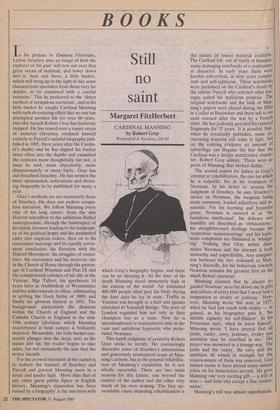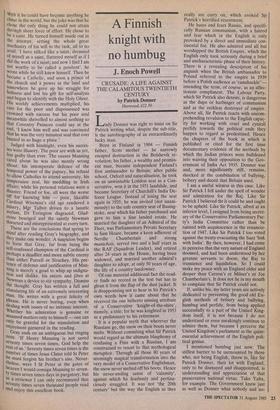BOOKS
Still no saint
Margaret FitzHerbert
CARDINAL MANNING by Robert Gray In his preface to Eminent Victorians, Lytton Strachey uses an image of how the explorer of the past 'will row out over that great ocean of material, and lower down into it, here and there, a little bucket, which will bring up to the light of day some characteristic specimen from those very far depths, to be examined with a careful curiosity.' This he preferred to the 'direct method of scrupulous narration', and in his little bucket he caught Cardinal Manning with such devastating effect that no one has attempted another life for over 6() years. Into this breach Robert Gray has fearlessly stepped. He has rowed over a vaster ocean of material (Strachey confined himself entirely to Purcell's spiteful biography pub- lished in 1895, three years after the Cardin al's death) and he has dipped his bucket more often into the depths and examined the contents more thoughtfully but not, it must be said, more objectively, more dispassionately or more fairly. Gray has out-Strachied Strachey. He has written the most opinionated, contentious and divert- ing biography to be published for many a year.
Gray's methods are not exclusively those of Strachey. He does not eschew scrupu- lous narration. We follow Manning every step of his long career: from the dim Harrow schoolboy to the ambitious Balliol undergruadate, through the bankruptcy of his family fortunes leading to the bankrupt- cy of his political hopes and his uninspired entry into anglican orders; then on to his convenient marriage and its equally conve- nient conclusion; his flirtation with the Oxford Movement, his struggles of consci- ence, his conversion and his meteoric rise in the Church of Rome through the patron- age of Cardinal Wiseman and Pius IX and the conspiritorial schemes of his ally in the Vatican, Mgr Talbot; his apotheosis 14 years later as Archbishop of Westminster and his achievements in office, culminating in settling the Dock Strike of 1889; and finally his glorious funeral in 1892. The background, particularly the divisions within the Church of England and the Catholic Church in England in the mid- 19th century (divisions which Manning exacerbated in both camps) is brilliantly depicted. Meanwhile, the little bucket con- stantly plunges into the deep, and, as the asides pile up, the reader begins to take sides, but not necessarily the side that the writer intends.
For the avowed intention of the author is to redress the balance of Strachey and Purcell and present Manning anew in a fairer and kinder light. 'More than that of any other great public figure in English history, Manning's reputation has been ruined by a biography' is the assertion with Weidenfeld & Nicolson, £16.95 which Gray's biography begins, and there can be no denying it. At the time of his death Manning stood immensely high in the esteem of the world. An estimated 400,000 people filed past his body during the four days he lay in state. Traffic in Victoria was brought to a halt and queues stretched to Vauxhall Bridge. The poor of London regarded him not only as their champion but as a saint. Now he is unremembered or remembered only as the vain and ambitious hypocrite who perse- cuted Newman.
This harsh judgment of posterity Robert Gray seeks to rectify. He convincingly discredits some of Strachey's insinuations and generously reinterprets some of Man- ning's actions, but in the general rehabilita- tion of Manning's reputation he is not wholly successful. There are two main reasons for this failure, one beyond the control of the author and the other very much of his own making. The first un- avoidable cause impeding rehabilitation is
the nature of source material available. The Cardinal left, out of vanity or humility, many damaging notebooks of a confession- al character. In early years these were harshly self-critical, in later years compla- cent and self-righteous. These notebooks were purloined on the Cardinal's death by the odious Purcell who selected what pas- sages suited his malicious purpose. The original notebooks and the bulk of Man- ning's papers were placed during the Blitz in a cellar in Bayswater and there left to rot until rescued after the war by a French abbe. He has jealously guarded his tattered fragments for 35 years. It is possible that, when he eventually publishes, some ex- onerating material will come to light, but on the existing evidence no amount of subterfuge can disguise the fact that the Cardinal was a deeply unattractive charac- ter. Robert Gray admits: 'There were as- pects of Manning that invited dislike.'
The second reason for failure in Gray's attempt ,at rehabilitation, the one for which he is culpable, lies in his treatment of Newman. In his desire to reverse the judgment of Strachey, he uses Strachey's tactics on Newman, the weapons being snide comment, loaded adjectives and in- nuendo. For his learning and beautiful prose, Newman is sneered at as 'the fastidious intellectual', his delicacy and humility are described as 'obfuscations,' his straightforward dealings become his `serpentine maneuverings' and his legiti- mate complaints are dismissed as 'whinge- ing'. Nothing that Gray writes dimi- nishes Newman and the attempt is both unworthy and unprofitable. Any compari- son between the two redounds to Man- ning's discredit, for his behaviour towards Newman remains the greatest blot on his much flawed character.
Manning claimed that he always re- garded Newman 'as so far above me in gifts and culture of every kind that I never had a temptation to rivalry or jealousy.' How- ever, Manning wrote this note in 1877, when he had lost touch with reality — or gained, as his biographer puts it, 'his infinite capacity for self-illusion'. In his Protestant days, when he knew himself, Manning wrote 'I have prayed that all pride; vanity, envy, jealousy, rivalry and ambition may be crucified in me.' His prayer was answered in a strange way. The pride and the vanity, the envy and the ambition all waxed in strength but the consciousness of them was removed. God indeed seems to have played many unkind jokes on his humourless servant. He gave Manning one very exciting gift — a will of iron — and little else except a fine counte- nance.
Manning's will was almost superhuman.
With it he could have become anything he chose in the world, but the joke was that he chose the only thing he could not attain through sheer force of effort. He chose to be a saint. He turned himself inside out in the attempt, setting the whole great machinery of his will to the task, all to no avail. have talked like a saint, dreamed of myself as a saint, flattered myself as if I did the work of a saint; and now I find I am not worthy to be called a penitent', he wrote while he still knew himself. Then he became a Catholic, and soon a prince of the church and a power in the land and somewhere he gave up his struggle for holiness and lost his gift for self-analysis and began to identify with the Holy Ghost. His worldy achievements multiplied, his care for the poor and dispossessed was crowned with success but his poor soul Meanwhile shrivelled to almost nothing so that Coventry Patmore could say at the end, 'I knew him well and was convinced that he was the very minutest soul that ever buzzed in so huge a place.' Judged with hindsight, even his succes- ses were illusory. The poor are with us yet, less godly than ever. The causes Manning cared about he was also mostly wrong about: his intemperate defence of the temporal power of the papacy, his refusal to allow Catholics to attend university, his temperance zeal, his meddling in Irish affairs; while his personal relations were a disaster. Friend or foe, all were the worse off for knowing him — poor, likeable Cardinal Wiseman's old age rendered a misery, Mgr Talbot driven to a lunatic asylum, Dr Errington disgraced, Glad- stone beseiged and the saintly Newman thwarted and misrepresented at every turn. These are the conclusions that spring to mind after reading Gray's biography, and they make one wonder. A suspicion begins to form that Gray, far from being the self-confessed champion of the Cardinal is Perhaps a deadlier and more subtle enemy than either Purcell or Strachey. His pre- tence of defence and justification of Man- 91n8 is merely a goad to whip up indigna- tion and dislike, his sneers and jibes at Newman a device to stir sympathy. Dismiss the thought. Gray has written a full and stimulating life of an extremely interesting man. He writes with a great felicity of Phrase. He is never boring, even when dealing with issues of no intrinsic interest. Whether his admiration is genuine or assumed matters only to himself —one can Only be grateful for the stimulation and enjoyment garnered in the reading. Gray ends on an ambiguous but ringing nate- 'If Henry Manning is not saved seventy times seven times, God help the rest of us.' Seventy times seven times is the number of times Jesus Christ told St Peter he must forgive his brother's sins. Never- theless, were I St Peter at the gates of heaven l would consign Manning to seven- ty times seven times days in purgatory, but as a reviewer I can only recommend that seventy times seven thousand people read and enjoy this excellent book.











































 Previous page
Previous page